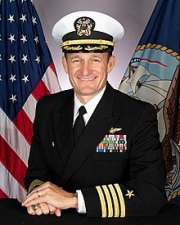Former NAS Lemoore aviator and carrier captain a credit to his crew, and his country

Retired Rear Admiral John Kirby, a CNN analyst, wrote that Crozier is “guilty of a process foul” in the way he failed to send out his letter over a secure network and didn’t include his immediate boss. But Kirby argued that he ultimately doesn’t consider these errors sufficient cause for being dismissed from a post.
Kirby added that there was no evidence that Crozier sent out a “blast-out email” to everyone he knows, and there wasn’t any evidence that he sent any emails to the media.
Usually, The Leader likely would not comment on a story of national significance and one with an apparent lack of local interest – but in this case, Capt. Crozier has a history in Lemoore.
Capt. Crozier, a U.S. Naval Academy grad and a man on a life-long mission, started flying helicopters early in his career. As he moved up the ranks, he found himself stationed at Naval Air Station Lemoore, where he transitioned to the F/A-18 Hornet and reporting to the VFA-97 Warhawks. Crozier did more than his share, serving on the USS Nimitz, a ship that played a crucial role in Operation Iraqi Freedom in 2003.
Along the way, the driven naval officer managed to earn a master’s degree in national security and strategic studies and then returned to Lemoore in 2010 to serve as a squadron commander with VFA-94 in Lemoore.
An officer of ambition and intelligence, the talented Hornet pilot, decided to take on yet a new and even more demanding role. In 2014 Crozier completed the Naval Nuclear Power training program, a grueling regimen and an important step that ultimately led him to the command of an aircraft carrier, one of the most menacing and complicated weapons in this country’s massive arsenal.
The ambitious naval officer – with a leadership role in mind – soon found himself the commanding officer of the USS Theodore Roosevelt, in charge of one of the most lethal weapons systems in the world.
A former naval officer, who served with Crozier in Lemoore, spoke with The Leader and described his former leader as an officer of distinction, a talented commander, and a man truly dedicated to the U.S. Navy and his country. He also said that Crozier didn’t deserve his firing and that he was acting in the best interests of his sailors as the coronavirus began taking its toll on his sailors and officers.
I am certainly aware of sailors, and some retired, some on active duty, who, while admiring Crozier, insist that he violated the chain of command, a necessary component needed to maintain continuity in the armed forces. At the same time, there are military men – as evidenced by Admiral Mike Mullen – who champion Crozier’s concern for the welfare of his troops.
It was undoubtedly clear that the Roosevelt’s crew appreciated their captain. As he walked down the gangplank following his dismissal last week, they cheered. Capt. Crozier gracefully returned their cheers with a salute of his own.
His crime? The commanding officer of the Roosevelt wrote a letter to his superiors about the coronavirus outbreak among his sailors, and according to news reports “criticized what he called an inappropriate focus on testing crew members that slowed his efforts to have them removed from the ship to be quarantined in Guam, where the carrier had stopped.
“We are not at war. Sailors do not need to die,” stated a concerned Crozier in his letter. “If we do not act now, we are failing to properly take care of our most trusted asset – our sailors.”
The “acting” secretary of the navy, Thomas Modly, said he lost confidence in Crozier’s ability to command his sailors and his ship when asked by reporters the cause of the dismissal. Modly said Crozier’s “widely distributed” letter that described the growing threat of coronavirus – that had up to that point sickened more than 100 of the Roosevelt’s crew members – had “allowed emotion” to color his judgment and that the captain’s letter “was sent outside the chain of command” by failing to alert his immediate supervisors, including Strike Wing Commander Rear Adm. Stuart Baker.
Modly took his criticism a step too far when, during a visit to the USS Theodore Roosevelt, he spoke to the crew and unwisely announced that Capt. Crozier either was “too naïve or too stupid to command a ship.”
Indeed, it was a poor choice of words used to describe a naval officer with a sterling record, who, during a long and distinguished career, moved gracefully from helicopters to navy jets, and finally, the command of an aircraft carrier.
On Tuesday, the acting secretary of the navy, facing intense criticism for his remarks, submitted his resignation.
It turns out that Crozier’s letter spurred efforts to move thousands of crew members ashore in Guam, and the sad irony now is that Crozier has been diagnosed with coronavirus.
The Leader can only pray that Capt. Crozier, a credit to the Lemoore community and the nation, recovers quickly and returns to duty. The nation, and his sailors, need such good men.
Opinion
- Valadao supports rural cooperatives, communities with legislation
- Kings Democrats condemn vandalism at Rep. Valadao's Hanford office
- Breaking down barriers to care and protecting seniors' well being
- A public perspective on health care and Medicare Advantage
- The Leader recommends Lupe Solis, Joe Neves be returned to local elected positions
- Westlands Water District celebrates 70th anniversary in San Joaquin Valley
_0.jpg)

.jpg)



